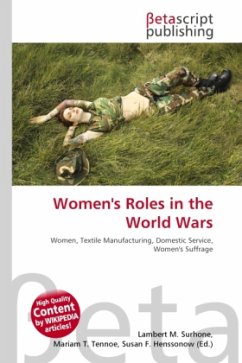
Female Roles in the World Wars
Versandkostenfrei!
Versandfertig in 6-10 Tagen
23,99 €
inkl. MwSt.

PAYBACK Punkte
12 °P sammeln!
High Quality Content by WIKIPEDIA articles! High Quality Content by WIKIPEDIA articles! Wars of the twentieth century was an important factor in the outcome of both wars. This involvement changed the social status and working lives of women in many countries from that point onwards. Women's contribution to both wars was significant; though the attitudes towards their contribution were typically paternalistic.Prior to the First World War women's role in society in western countries was generally confined to the domestic sphere (but not necessarily their own home) and to certain types of jobs: '...
High Quality Content by WIKIPEDIA articles! High Quality Content by WIKIPEDIA articles! Wars of the twentieth century was an important factor in the outcome of both wars. This involvement changed the social status and working lives of women in many countries from that point onwards. Women's contribution to both wars was significant; though the attitudes towards their contribution were typically paternalistic.Prior to the First World War women's role in society in western countries was generally confined to the domestic sphere (but not necessarily their own home) and to certain types of jobs: 'Women's Work'. In Great Britain for example, just before World War I, out of an adult population of about 24 million women, around 1.7 million worked in domestic service, 800,000 worked in the textile manufacturing industry, 600,000 worked in the clothing trades, 500,000 worked in commerce and 260,000 in local and national government . The British textile and clothing trades, in particular, employed far more women than men and could be regarded as 'women's work'.












